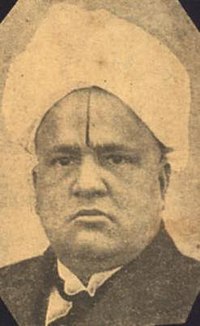V. T. Krishnamachari
|
Rao Bahadur Sir Vangal Thiruvenkatachari Krishnamachari KCSI KCIE |
|
|---|---|
 |
|
| Vice-President of the Planning Commission of India | |
| Prime Minister of Jaipur | |
|
In office 1946–1949 |
|
| Diwan of Baroda | |
|
In office 1927–1944 |
|
| Monarch | Sayajirao Gaekwad III |
| Personal details | |
| Born | 8 February 1881 Vangal, Trichy District, British India |
| Died | 14 February 1964 (aged 83) Madras, India |
| Political party | Indian National Congress |
| Spouse(s) | Rangammal |
| Children | Vedammal Gopala Iyengar, V. K. Thiruvenkatachari, V. K. Rangaswami, Jayammal Srinivasan, V. K. Ramaswami (1928–1969) |
| Alma mater | Presidency College, Madras |
| Occupation | lawyer, civil servant, Madras Law College |
Rao Bahadur Sir Vangal Thiruvenkatachari Krishnamachari KCSI, KCIE (8 February 1881 – 14 February 1964) was an Indian civil servant and administrator. He served as the Diwan of Baroda from 1927 to 1944, Prime Minister of Jaipur State from 1946 to 1949 and as a member of the Rajya Sabha from 1961 to 1964 .
Krishnamachari was born in the village of Vangal in the then Karur District on 8 February 1881. He was the fourth and youngest son of Vangal Thiruvenkatachari (1837–1934) a rich and powerful landlord.
Krishnamachari had his early education in Vangal and graduated from the Presidency College, Madras and Madras Law College. On completion of his education, Krishnamachari qualified for the Indian civil service.
Krishnamachari served the Additional Secretary of the Madras Board of Revenue from 1913 to 1919 and was the trustee to the Vizianagaram estate from 1919 to 1922.
Krishnamachari was appointed Diwan of Baroda in 1927 and he served from 1927 to 1944. Krishnamachari has been one of the longest serving Diwans of Baroda. While serving as Diwan, Krishnamachari also served in the Committee of Ministers, Chamber of Indian Princes from 1941 to 1944.
While serving as Diwan of Baroda, Krishnamachari launched a massive rural reconstruction programme in the princely state.
Krishnamachari served as Prime Minister of Jaipur State from 1946 to 1949. he served in the Indian Finances Enquiry Committee from 1948 to 1949 and in Indian Fiscal Commission in 1949.
He was a delegate to all the three Round Table Conferences and was a delegate to the assembly of League of Nations during the years 1934 to 1936.
He was staunch in his support for the major Indian Princely states to join the Indian Union.
...
Wikipedia
